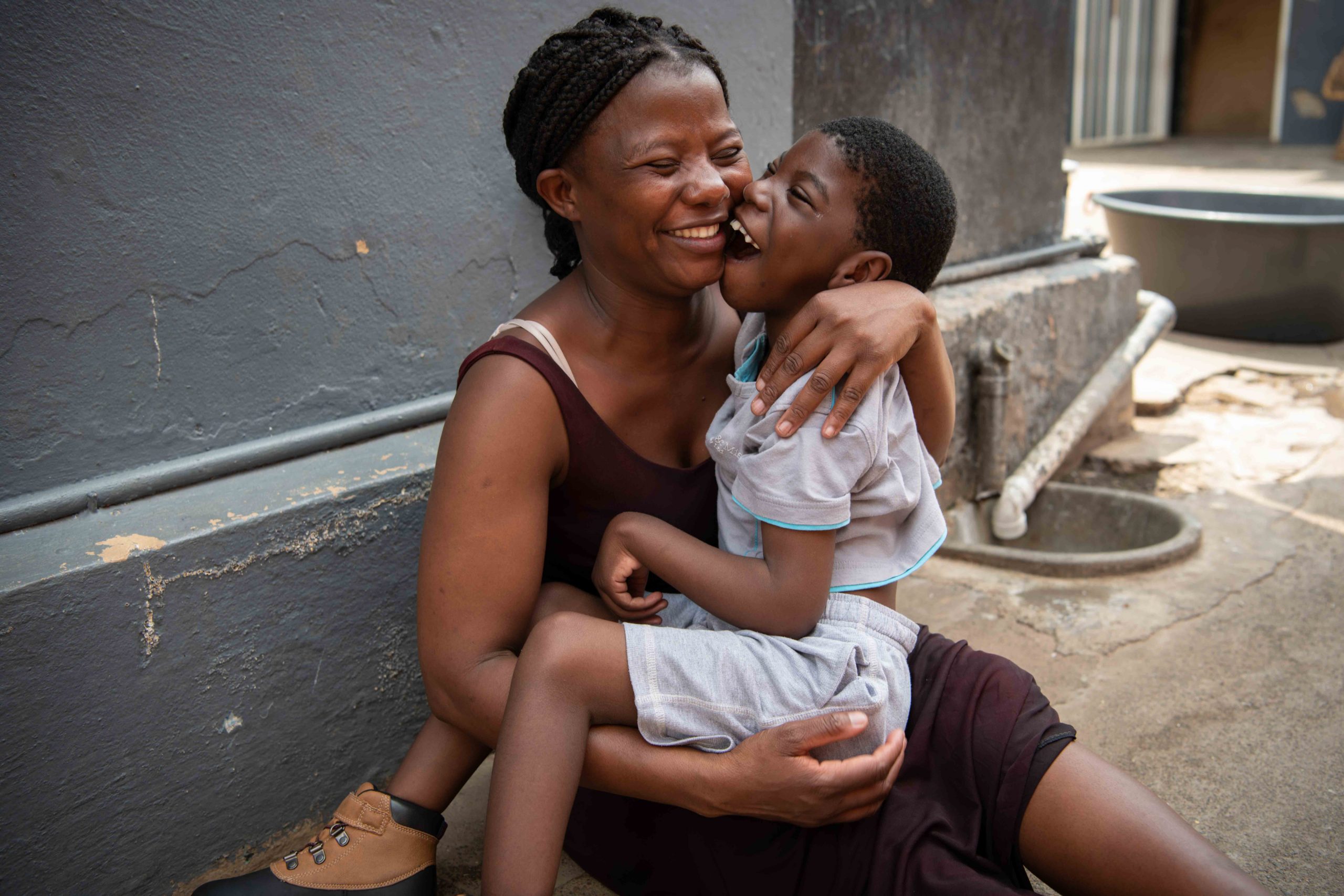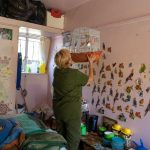Parental love helps children with disabilities
Battling slow and inadequate government care, parents of children with disabilities both go it alone and set up organisations to help their offspring live full lives.
Author:
2 April 2019

For the past year and a half 35-year-old Leah Ndanga, the mother of eight-year-old Emmanuel Ndanga, who has cerebral palsy, has been struggling to place him at a special needs school.
Zimbabwe-born Emmanuel cannot walk or talk and has never been to school. Ndanga is undocumented, unemployed and in a desperate state. Her repeated attempts to find a school in Johannesburg for Emmanuel have come to nothing.
Following several visits to the department of education in Ormonde, Ndanga was told she needed to consult a psychologist to evaluate the child and decide which school he should attend.
When she met the psychologist last year, the encounter was unpleasant. “She said to me this child cannot go to school, because he cannot help himself.” In disbelief Ndanga said, “I am here because he has a disability. I need a special school. How do you expect him to do things for himself?”
Ndanga says she wasted her money travelling back and forth. Emmanuel’s father died from a short illness when Ndanga was seven months pregnant, resulting in her and Emmanuel living on donations. She says that in past years she would sit on the street and beg.
Children with disabilities have rights
A report by Human Rights Watch, Complicit in Exclusion: South Africa’s Failure to Guarantee an Inclusive Education for Children with Disabilities (2015), states that children with disabilities have the right to free and compulsory education, as do all children.
“Evidence in this report suggests that the government has not reached universal education because it has left over half a million children with disabilities out of school, and hundreds of thousands of children with disabilities, who are presently in school, behind,” says the report.
One of its key findings is the discrimination faced by children with disabilities when accessing all types of public schools. “Schools often decide whether they are willing or able to accommodate students with particular disabilities or needs. In many cases, children with intellectual disabilities, multiple disabilities, and autism or foetal alcohol syndrome are particularly disadvantaged.”
Significantly, the report emphasised that in most cases schools make the fundamental decision of deciding who may enrol.
Emmanuel at home
Ndanga was washing her laundry by hand when she welcomed New Frame into her rented one-room home at La Rochelle in Johannesburg, paid for through donations. The room is divided by a curtain into a bedroom and kitchen.
Ndanga prepared wholegrain breakfast cereal in a yellow plastic container for Emmanuel before she sat down and explained to New Frame the difficulties she has had with the psychologist. She went back to see the psychologist a second time to try and understand the department’s failure to place her child.
Ndanga said that “name-calling” of her son made her rethink her abilities as a mother. “It was so bad. I even ask myself, if I keep on crying like this, what is going to happen? He needs help from me,” she said as she fed Emmanuel his cereal.
Related article:
When she gave birth to Emmanuel, Ndanga said she was ignored and endured pain for more than three days at a hospital in Zimbabwe. Emmanuel was on oxygen for two weeks and was fed through tubes.
On 18 March, New Frame contacted the Gauteng education department about Ndanga’s claims. The department requested Ndanga’s contact details, saying that it needs to talk to her before being able to give a detailed response.
On 26 March, the department’s spokesperson Steve Mabona said relevant people have been sent to engage Nganda’s matter. In addition, the department would look into New Frame’s request for a response.
Today Mabona responded via email saying a meeting has been set up for a “multi-disciplinary assessment” of Emmanuel at a school in the area where the mother stays. “For this reason, the assessment is scheduled for when schools reopen. Appropriate placement will be facilitated once the required information is available,’’ said Mabona.
A gift of hope
Another parent with a child living with cerebral palsy, Edward Msimango, 35, explained to New Frame the importance of exposing a child living with disabilities to the world.
One way in which Msimango, a technician, has done this is through “taking a challenged child to the world – where 200 kids living with disabilities and orphans had a picnic”.
Msimango, the father of 11-year-old Siphesihle Dlamini, started a non-governmental organisation last year called Siphesihle, which translates as “beautiful gift”.
“It teaches parents how to help their children at home. We [as] parents with challenged children, we tend to leave the responsibility to the physiotherapist at school … what happens during the school holidays?”
Msimango plans to organise a sport event in Soweto where able and disabled children will play their favourite sport.

Siphesihle’s early years
When Siphesihle was born, her mother apparently gave birth with no assistance. “There was no nurse, there was no one that could give assistance, in terms of normal procedure,” explained Msimango.
“She was screaming by herself, then five minutes later came a sister, and they found Siphesihle there. Then they had to rush Siphesihle to incubators and check if everything is fine,” he continued.
He said they realised that the child had contracted jaundice, and later on developed an abscess in her armpits.
Related article:
Three months after the birth, Msimango realised that his daughter was not developing normally. “We realised that she was delaying with some of the progress, such as sit-ups, facial expressions, she was very slow,” he said.
What also concerned the parents was her rapid weight gain. Msimango sat next to his daughter on the couch with Siphesihle’s crutches leaning on the arm of the couch.
The father said that five months after her birth, doctors ran tests and diagnosed Siphesihle with cerebral palsy. He points out the lack of meticulous explanation of the syndrome when the diagnosis was made, adding that he was only told that she would be all right if she took her medication.
Notable progress
Msimango said after surgeries and physiotherapy Siphesihle has improved dramatically. However, it is not yet a smooth ride for him and his daughter.
“It is difficult to move around with a child that has a disability, especially when you don’t have a car. And you are far from the means of entertaining the child. It’s a mission because we have to use a wheelchair. She can’t walk a long distance with crutches.”
Siphesihle goes to Forest Town School in Johannesburg, more than 30km away from her home in Vosloorus, a township in Ekurhuleni, Gauteng. Msimago said he pays a transport fee of R1 200 every month. Msimango also spends close to R180 to take Siphesihle to her appointments. He said sometimes he pays for an additional taxi seat for the wheelchair.
He added there are times when his daughter does not get a scholarship, and then he has to pay R1 300 in school fees.
Furthermore, Msimago explained that Siphesihle’s mother left when her daughter was still young. He said because it’s only him and his daughter, he sometimes asks for help from the neighbours.
Msimango said what makes him happy is seeing his daughter grow with strength. “She never walked. She said the minute she started walking she was going to buy McDonald’s [and she did that].” He said his daughter can now walk, write, wash and feed herself.
Msimango and his daughter bond through a teddy bear called “Mr Fireman”. He grows tearful as he explains that the cuddly toy reminds Siphesihle of him because he has a similar work overall with reflective strips.



